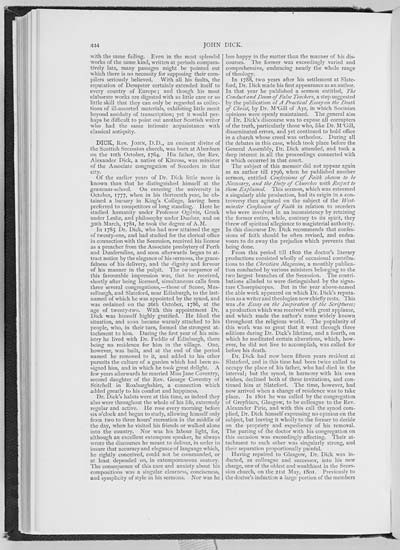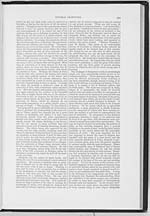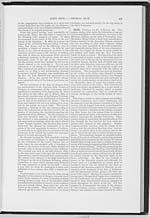444
with the same failing. Even in the most splendid
works of the same kind, written at periods compara-
tively late, many passages might be pointed out
which there is no necessity for supposing their com-
pilers seriously believed. With all his faults, the
reputation of Dempster certainly extended itself to
every country of Europe; and though his most
elaborate works are digested with so little care or so
little skill that they can only be regarded as collec-
tions of ill-assorted materials, exhibiting little merit
beyond assiduity of transcription; yet it would per-
haps be difficult to point out another Scottish writer
who had the same intimate acquaintance with
classical antiquity.
DICK, Rev. JOHN, D.D., an eminent divine of
the Scottish Secession church, was born at Aberdeen
on the 10th October, 1764. His father, the Rev.
Alexander Dick, a native of Kinross, was minister
of the Associate congregation of Seceders in that
city.
Of the earlier years of Dr. Dick little more is
known than that he distinguished himself at the
grammar-school. On entering the university in
October, 1777, when in his thirteenth year, he ob-
tained a bursary in King's College, having been
preferred to competitors of long standing. Here he
studied humanity under Professor Ogilvie, Greek
tinder Leslie, and philosophy under Dunbar, and on
30th March, 1781, he took the degree of A.M.
In 1785 Dr. Dick, who had now attained the age
of twenty-one, and had studied for the clerical office
in connection with the Secession, received his license
as a preacher from the Associate presbytery of Perth
and Dunfermline, and soon afterwards began to at-
tract notice by the elegance of his sermons, the grace-
fulness of his delivery, and the dignity and fervour
of his manner in the pulpit. The consequence of
this favourable impression was, that he received,
shortly after being licensed, simultaneous calls from
three several congregations,�those of Scone, Mus-
selburgh, and Slateford, near Edinburgh, to the last-
named of which he was appointed by the synod, and
was ordained on the 26th October, 1786, at the
age of twenty-two. With this appointment Dr.
Dick was himself highly gratified. He liked the
situation, and soon became warmly attached to his
people, who, in their turn, formed the strongest at-
tachment to him. During the first year of his min-
istry he lived with Dr. Peddie of Edinburgh, there
being no residence for him in the village. One,
however, was built, and at the end of the period
named he removed to it, and added to his other
pursuits the culture of a garden which had been as-
signed him, and in which he took great delight. A
few years afterwards he married Miss Jane Coventry,
second daughter of the Rev. George Coventry of
Stitchell in Roxburghshire, a connection which
added greatly to his comfort and happiness.
Dr. Dick's habits were at this time, as indeed they
also were throughout the whole of his life, extremely
regular and active. He rose every morning before
six o'clock and began to study, allowing himself only
from two to three hours' recreation in the middle of
the day, when he visited his friends or walked alone
into the country. Nor was his labour light, for,
although an excellent extempore speaker, he always
wrote the discourses he meant to deliver, in order to
insure that accuracy and elegance of language which,
he rightly conceived, could not be commanded, or
at least depended on, in extemporaneous oratory.
The consequence of this care and anxiety about his
compositions was a singular clearness, conciseness,
and symplicity of style in his sermons. Nor was he
less happy in the matter than the manner of his dis-
courses. The former was exceedingly varied and
comprehensive, embracing nearly the whole range
of theology.
In 1788, two years after his settlement at Slate-
ford, Dr. Dick made his first appearance as an author.
In that year he published a sermon entitled, The
Conduct and Doom of False Teachers, a step suggested
by the publication of A Practical Essay on the Death
of Christ, by Dr. M'Gill of Ayr, in which Socinian
opinions were openly maintained. The general aim
of Dr. Dick's discourse was to expose all corrupters
of the truth, particularly those who, like Dr. M 'Gill,
disseminated errors, and yet continued to hold office
in a church whose creed was orthodox. During all
the debates in this case, which took place before the
General Assembly, Dr. Dick attended, and took a
deep interest in all the proceedings connected with
it which occurred in that court.
The subject of this memoir did not appear again
as an author till 1796, when he published another
sermon, entitled Confessions of Faith shown to be
Necessary, and the Ditty of Churches with Respect to
them Explained. This sermon, which was esteemed
a singularly able production, had its origin in a con-
troversy then agitated on the subject of the West-
minster Confession of Faith in relation to seceders
who were involved in an inconsistency by retaining
the former entire, while, contrary to its spirit, they
threw off spiritual allegiance to magisterial authority.
In this discourse Dr. Dick recommends that confes-
sions of faith should be often revised, and endea-
vours to do away the prejudice which prevents that
being done.
From this period till 1800 the doctor's literary
productions consisted wholly of occasional contribu-
tions to the Christian Magazine, a monthly publica-
tion conducted by various ministers belonging to the
two largest branches of the Secession. The contri-
butions alluded to were distinguished by the signa-
ture Chorepiscopus. But in the year above-named
the able work appeared on which Dr. Dick's reputa-
tion as a writer and theologian now chiefly rests. This
was An Essay on the Inspiration of the Scriptures;
a production which was received with great applause,
and which made the author's name widely known
throughout the religious world. The popularity of
this work was so great that it went through three
editions during Dr. Dick's lifetime, and a fourth, on
which he meditated certain alterations, which, how-
ever, he did not live to accomplish, was called for
before his death.
Dr. Dick had now been fifteen years resident at
Slateford, and in this time had been twice called to
occupy the place of his father, who had died in the
interval; but the synod, in harmony with his own
wishes, declined both of these invitations, and con-
tinued him at Slateford. The time, however, had
now arrived when a change of residence was to take
place. In 1801 he was called by the congregation
of Greyfriars, Glasgow, to be colleague to the Rev.
Alexander Pirie, and with this call the synod com-
plied, Dr. Dick himself expressing no opinion on the
subject, but leaving it wholly to the former to decide
on the propriety and expediency of his removal.
The parting of the doctor with his congregation on
this occasion was exceedingly affecting. Their at-
tachment to each other was singularly strong, and
their separation proportionally painful.
Having repaired to Glasgow, Dr. Dick was in-
ducted, as colleague and successor, into his new
charge, one of the oldest and wealthiest in the Seces-
sion church, on the 21st May, 1801. Previously to
the doctor's induction a large portion of the members

![]() Universal Viewer |
Universal Viewer | ![]() Mirador |
Large image | Transcription
Mirador |
Large image | Transcription
![]()

